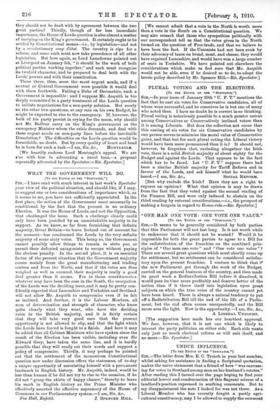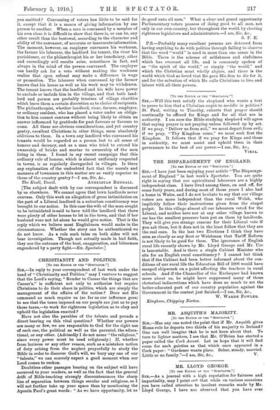UNDUE INFLUENCE.
rTo TEE EDITOR GP TEE "SPECTATOR.']
Srn.,—The letter from Mrs. E. C. Trench in your last number, whilst asking for assistance in finding a Scriptural quotation, makes the naive statement that a friend of hers "was canvass- ing for votes in Scotland among men on her husband's estates." After reading this I turned over the page hoping to find your editorial horror and condemnation of this flagrant misuse of a. landlord's position expressed in scathing comments. But to my disappointment the note I looked for was not there. As a Liberal Member who has recently fought a partly agri- cultural constituency, rnay I be allowed to supply the comment you omitted ? Canvassing of voters has little to be said for it, except that it is a means of giving information by one person to another. When a man is canvassed by a member of his own class it is difficult to show that there is, or can be, any other result than the bestowal, according to the character and ability of the canvasser, of accurate or inaccurate information. The moment, however, an employer canvasses his workman, the farmer his labourer, the landlord his tenant, the vicar his parishioner, or the philanthropist his or her beneficiary, other and exceedingly evil results arise, sometimes in fact, and always in the mind of the person canvassed. The employer can hardly ask for a vote without making the workman realise that open refusal may make a difference in wage or promotion. The labourer when canvassed by the farmer knows that his house as well as his work may be withdrawn. The tenant knows that the landlord and his wife have power to exclude or include him in the village, and that both land- lord and parson are probably trustees of village charities which leave them a certain discretion as to choice of recipients. The philanthropist, whether landlord, vicar, farmer, employer, or ordinary resident, who has placed a voter under an obliga- tion to him cannot canvass without being likely to obtain an answer influenced by gratitude for past favours or favours to come. All these are obvious considerations, and yet country gentry, excellent Christians in other things, seem absolutely oblivious to them. In a town any landlord who canvassed his tenants would be regarded as a person lost to all sense of honour and decency, and as a man who tried to extend his ownership of bricks and mortar to ownership of the men living in them. I found in my recent campaign that this ordinary rule of honour, which is almost uniformly respected in towns, is as regularly disregarded in villages. Is there any explanation of the undoubted fact that the morals and manners of townsmen in this matter are so vastly superior to those of the country gentry P—I am, Sir, &c.,
[The subject dealt with by our correspondent is discussed by us elsewhere. We cannot agree that town landlords never canvass. Only this week an allegation of gross intimidation on the part of a Liberal landlord in a suburban constituency was brought to our notice. In this case the wife of the man sought to be intimidated is said to have told the landlord that there were plenty of other houses to let in the town, and that if her husband were not let alone he would give notice. That is the reply which we believe most Englishmen would make in the circumstances. Whether the story can be authenticated we do not know. As a rule such tales on both sides will not bear investigation. Though not actually made in bad faith, they are the outcome of the heat, exaggeration, and bitterness engendered by a party fight.—ED. Spectator.]











































 Previous page
Previous page